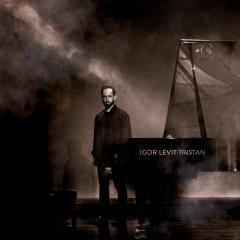On Igor Levit’s double album “Tristan” – which will be released on Sony Classical on September 9, 2022 - the pianist explores nocturnal themes of love and death, fear, ecstasy, loneliness & redemption in the music of Richard Wagner, Franz Liszt, Gustav Mahler & Hans Werner Henze. It includes Levit’s first concerto recording with the Gewandhausorchester Leipzig under Franz Welser-Möst with the album’s central work Henze’s “Tristan” for piano, electronic tapes and orchestra.
The five works, including Liszt’s “Liebestraum no. 3” and “Harmonies du Soir”, as well as transcriptions of Wagner’s “Prelude to Tristan und Isolde” and Mahler’s “Adagio from Symphony no. 10”, span a period of 135 years (1837 to 1973) and represent very different genres. Only one of these works was originally conceived for piano solo, but Igor Levit’s exploration of borderline experiences in our lives – death in Life (2018), spirituality in Encounter (2020) and now, with Tristan, the link between love, death and our need for redemption – inevitably means that it is not just masterpieces for the piano that are central to his concern but, above all, compositions in which certain thematic associations find their most personal expression.
Levit’s own thoughts revolve less around the themes of love and death as such than around the experience of night and of the nocturnal as a dark alternative to our conscious actions by day. “Night has so many faces. It can signal a place of refuge or the loss of control, it signifies love and death, and it is the place where we feel our deepest, most paranoid fears,” says Levit. “The Adagio from Mahler’s Tenth Symphony contains a famous outburst of pain in the form of a dissonant chord, and Wagner’s Tristan und Isolde is all about a kind of emotional nuclear meltdown. All of the piece’s essential actions take place at night. In his reminiscences, Hans Werner Henze likewise recalled his work on Tristan as a time of nightmares and of dreamlike hallucinations.”
Hans Werner Henze’s Tristan – described by the composer as a set of “Preludes for piano, tape and orchestra” – is a raptly refined hybrid work comprising passages for solo piano and electronics and is a concerto, a symphony and a piece of music theatre all wrapped into one. The present recording of this work was made during the concerts that were given in Leipzig in November 2019.
Liszt’s nocturne in A♭ major – his Liebestraum no. 3 – derives from a setting of melancholic lines by Ferdinand Freiligrath: “Oh, love as long as you can love! / Oh, love as long as you could crave! / That hour is fast approaching when / You’ll stand and weep beside the grave!”
The same sense of nocturnal despair is also found with Mahler, who in late July 1910 was working on the opening movement of his Tenth Symphony when he discovered that his wife was having an affair. Igor Levit performs this Adagio in a little-known piano transcription by the Scottish composer Ronald Stevenson, whose great Passacaglia on DSCH he has done so much recently to promote.
Only in Harmonies du soir, the eleventh of Liszt’s twelve Études d’exécution transcendante, is there any sense of reconciliation, a peaceful counterweight to the ecstasies and nightmares experienced by those Wagnerian and Mahlerian figures who in Wagner’s own words are “devoted to the night”.

